
Henry Dorn has always been hardworking, and at times, he admits, he has taken on too much. With the support of his spouse, Alicia, who is a mental health professional, he was able to overcome setbacks and eventually earn two doctorates at MSU.
After years of work and delayed dreams, today Dr. Henry Dorn holds two doctorates from Michigan State University, one in conducting that he completed in 2022 and one in composition that he completed in 2023. His story is one of success, burnout and depression, financial distress, mentoring, and the power of music.
After a six-year hiatus from when Henry managed a CVS store to support his family and felt he had completely abandoned hope of a career in music, this fall he begins his tenure as Conductor of the St. Olaf Band at St. Olaf College in Northfield, Minnesota. Henry will also maintain a composition studio.
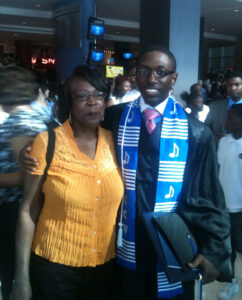
When Henry Dorn graduated from the University of Memphis in 2010, his mother, Cynthia, was by his side. She passed away in 2017, and Henry says her last gift to him was her subtle way of encouraging him to never give up on his dreams of a career in music.
At St. Olaf, he will become an integral part of a revered music program, joining another MSU alum, Anton Armstrong, the college’s long-time choir director. It is simultaneously a lift off to a new beginning and a safe landing after a turbulent flight.
For Henry, music was a calling at an early age, from standing on the coffee table in his living room at three or four years old and dancing as his father played Motown records, to taking up trombone in his Little Rock, Arkansas school. He earned all-state honors on a borrowed instrument, and it meant a lot to him considering there were not many opportunities for young Black men to succeed in his hometown.
Henry earned a scholarship to study engineering at the University of Arkansas, but that was his father’s dream. He was never convinced it was the right path, and the calling of music was stronger than ever.
“I made a last minute decision to audition at the University of Memphis,” Henry said. “I rode a bus from Little Rock to Memphis by myself at 17 years old, and I took this audition using my studio professor’s horn because I didn’t have my own professional instrument to play.”

An accomplished trombonist, Henry Dorn (right) performed in several ensembles at the University of Memphis. Here he plays in a recording session with the Southern Comfort Jazz Orchestra.
Memphis accepted Henry with scholarship support. He majored in performance while playing in every ensemble he could and took composition classes. He narrowed his focus to composition, earning his degree in 2010 while still performing trombone at gigs in a lively blues scene in the city.
“At Memphis, I had too many irons in the fire,” he said. “I didn’t know at the time that I was suffering from burnout and just being overwhelmed. I’d taken on too much.”
Still, he was on a path, and he expected himself to continue and succeed. He almost immediately began a two-year program studying wind conducting at the Peabody Institute at Johns Hopkins University. He and his wife, Alicia (his girlfriend at the time), made the move to Baltimore. She pursued an advanced degree program as well and is now a mental health professional.
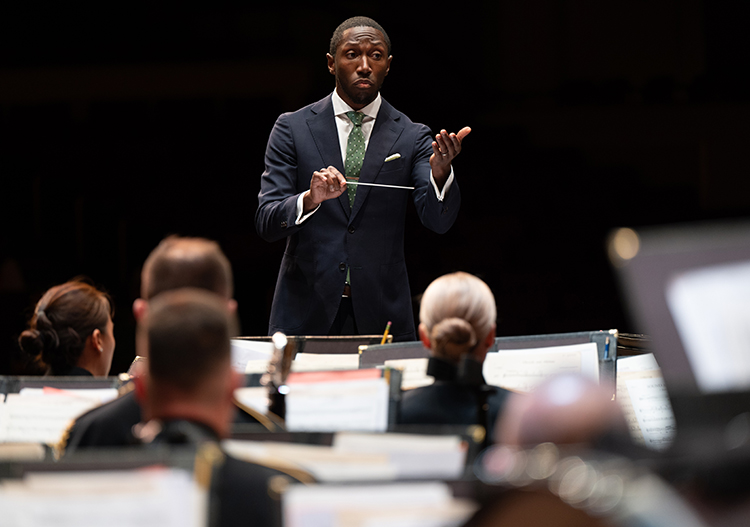
In the summer of 2022, Henry Dorn conducted The United States Army Band “Pershing’s Own” at Schlesinger Hall in Alexandria, Virginia.

After years away from music study due to financial struggles and personal crises, Henry Dorn quickly returned to form as a conductor and composer. Here, he works with the US Army Band at Ft. Myer in Virginia, rehearsing Viet Cuong’s Sound and Smoke.
With no break between programs and high demands in his master’s studies, Henry decided he needed to slow down. Finances were a big part of this decision, which is an all too common issue for graduate students. He described himself as “the definition of broke.”
He found work in Baltimore at an education company called Connections Academy, and a few years later took a job as a store manager for CVS.
“I went into a very serious state of depression. At some point, it was like, ‘all right, I guess I’m not doing music anymore.’ I abandoned ship,” he said.
His father passed away in 2013, and in 2017, his mother passed away from lung cancer. When she was ill, he felt guilt over not being with her in Little Rock. He contemplated moving back, but she told him not to. She told him she was proud of him and wanted him to keep pursuing his goals.
Henry knew his mother meant that he should keep pursuing music. “It was like her last gift to me,” he said.
When he decided to return to his master’s program, he ran into a serious administrative issue involving both of the institutions he attended. It stopped him in his tracks and threatened to derail his return to music study. It was extremely frustrating.

With great praise given to guidance by MSU faculty from the Band and Composition areas, Henry Dorn completed a DMA in conducting in 2022 and a second DMA in composition in 2023.
Alicia encouraged him to keep fighting for his place in the music world. She knew that Henry – a man who composed and arranged songs for his brass quartet in middle school – belonged there. His passion for music too great. His aptitude too strong to give up.
By this point, it had been six years since he studied music. He and Alicia were married, and their daughter was born. It had been a long break from music, and the longer it went on, the harder it seemed to get back to it. A hard-working man, he was successful as a store manager, and he did what he needed to do to make ends meet. Alicia, however, knew something was missing.
“It took my wife saying to me, ‘you’re going through some things,’” he explained. “I think she could tell that I was mourning the death of a career, this path that I had to let go.”
He realized that it was now or never. He realized that time has no guarantee, and what he described as an internal scream was yelling at him to get back to music.
“You give it everything you’ve got, and if it works, then you know that it was supposed to work. If it doesn’t work, then hey, you can at least walk away from it saying you gave it your best shot,” Henry said. “So, that’s what I did. I said that if I get a chance, I’m running towards this.”
Henry started running toward his music goals, and he hasn’t stopped.
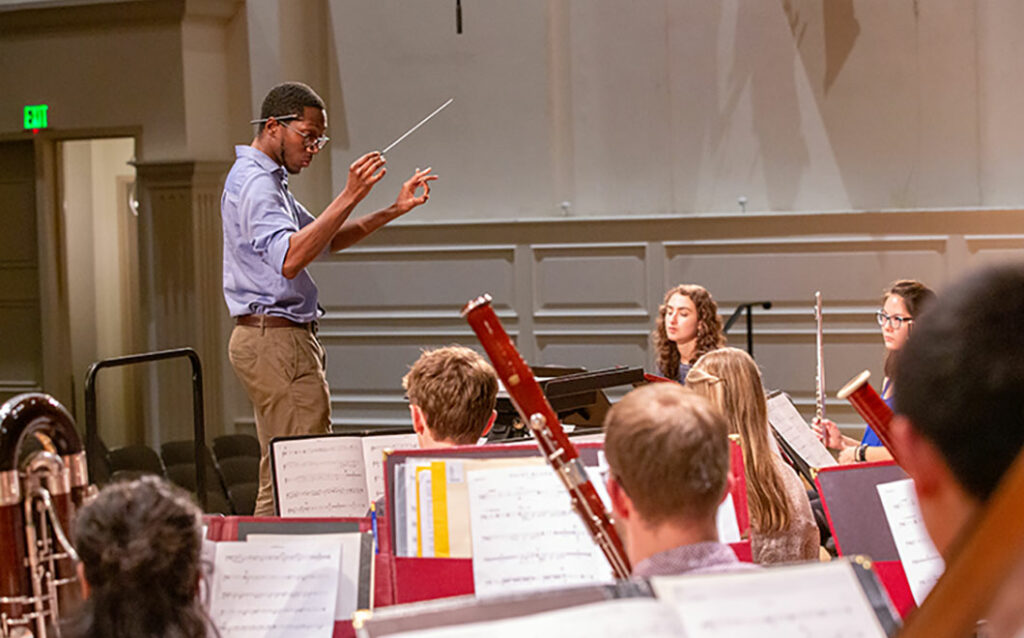
Henry Dorn, seen here working with the Peabody Wind ensemble in 2019, will assume the directorship of the band program at St. Olaf College in Minnesota this fall, making him the latest MSU band program alum taking on a leadership role in the field.
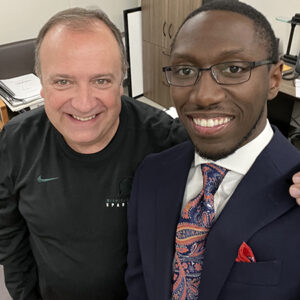
Professor Kevin Sedatole impressed Henry Dorn during a summer conducting symposium at MSU. Henry credits Sedatole’s guidance and networking expertise for the professional career he will begin this fall.
The administrative issue was resolved, he completed the master’s degree, and he knew a doctorate was his next move. He managed a dual focus on composing and conducting at Peabody and wanted to do the same for his doctorate, but where?
He researched and found that the MSU College of Music is one of only a few that met his needs, having high-level wind conducting and composition programs. It helped that he had attended a summer conducting symposium led by Dr. Kevin Sedatole, MSU’s Director of Bands and Chair of the Conducting Area. The experience would change his life.
“Blown away is probably not even the right way to put it,” Henry said about his experience working with Dr. Sedatole. “He is very, very good at what he does. His ability to draw sounds out of ensembles through movement alone was something that completely changed my way of thinking about what it is to be a conductor. I was completely blown away by his artistry. I remember thinking, ‘I want to do this the way this guy does it.’”
Over the past few years, Henry said he learned that Dr. Sedatole is also a master networker, always willing to share his knowledge and connections. He helps students by putting them in touch with conductors and others who can create meaningful, professional experiences.
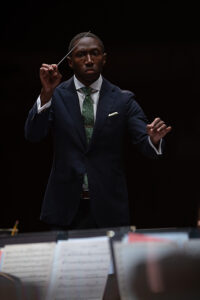
Henry Dorn will also teach composition at St. Olaf, and the Detroit Symphony Orchestra will perform his heartfelt piece Transitions during their 2023-2024 season. His piece …i forgot to say good morning makes its world premiere on June 2 in New York.
Within the Composition Area, Associate Professor of Conducting David Biedenbender has been Henry’s primary mentor. He describes Dr. Biedenbender as a “truly wonderful person and incredibly knowledgeable. He knows the right things to say to draw the last drop of inspiration out of every idea.”
Henry has high praise for other members of the MSU Composition Area faculty as well. He describes “Dr. Zhou Tian’s fine craftsmanship and orchestration ideas that can recolor any idea possible; Dr. Alexis Bacon’s insight into the most infinitesimally small details that matter in huge, deeply imaginative ways; and Dr. Ricardo Lorenz completely changing my thought process around the philosophy of our work as composers.”
Henry’s growth as a composer has led to the Detroit Symphony Orchestra choosing to perform his heartfelt piece Transitions during the 2023-2024 season. It is about his mother, her kind spirit, and her transition from this life. It was premiered by the Minnesota Orchestra in 2022, and another of his compositions, …i forgot to say good morning, makes its world premiere on June 2 in New York, performed by the American Composers Orchestra.
After more than ten years of hard work and struggle, these major successes can feel surreal. He is still trying to process working with Dr. Sedatole as a colleague, he said, and he is grateful for the guidance he received.
“I owe him quite a bit, and I appreciate how he has looked out for me and for what he’s done for me and my family since being here,” Henry said. “I know that where I am right now, a big part is truly because of the work that I’ve been able to do with him. I wouldn’t have thought it possible five years ago.”










